Christian speaker Rachel Gilson has gone into damage control mode and responded more fully to claims that she has a permissive attitude regarding whether gay-married folks who become saved should divorce their spouse.
We wrote about this recently after she suggested during her talk at the 2018 CRU conference that God hates gay people divorcing just as much as straight people and that when gay marriages end, “it breaks that image of marriage just as surely as anything else.”
She also spoke of a gay couple “divorcing” as a sad event, which is strange for a Christian to say when it should be a joyous occasion. While Gilson is likening it to the same sadness and sobriety we should feel when a straight couple gets divorced; it’s more like how we should feel when an incestuous father “divorces” the daughter he spent a decade grooming and then “married.” No tears here.
Specifically she said:
I do think that it’s pretty normal for someone who comes to Christ, to see ‘Oh, this isn’t the way God designed to use my sexuality.‘ They don’t have to negate all the good things that they’ve experienced with the person that they’ve been in a relationship with to recognize that God says something else about sexuality.
They might end up making a very big cost. I mean, I’ve known some people who decide to stay in that relationship legally, but to live celibately. To break off having sex, that has happened with some couples who both come to Christ. I’ve known some couples where one person came to Christ and decided that in order to honor the Lord, he needed to be celibate and his partner decided, his husband decided to leave him.I mean Paul talks about this reality in 1 Corinthians 7, sometimes if a spouse comes to know the Lord, the other spouse can’t abide it and they leave and then that person is you know, that person is free.
But sometimes it will mean yeah, sometimes it will mean getting a divorce. God hates divorce. He does. It breaks that image of marriage just as surely as anything else. What’s interesting is though God hates it, it is still sometimes allowed in the context of a broken world.
While she initially responded to the controversy on Twitter with a statement: “If someone in a same-sex marriage becomes a Christian, the path of obedience is to end that marriage by divorce. This has been my consistent teaching” Gilson sidesteps all the questions people were asking.
Instead, she presents a clarification that does almost nothing to respond to the question or concerns, all the while gaslighting her critics into thinking that her views have remained unchanged, when they are diametrically opposed to each other. Further, while her new statement says they should get divorced, she does not address questions like whether or not they should stop living together, whether or not they can remain platonic roommates, or several other options she seemed fine advocating for her in her previous statements.
On The Confronting Christianity Podcast, she adresses this talk:
And so that means some principles about divorce that we might normally bring in when we’re talking about marriage can feel confusing when we bring them to a same sex marriage. Because legally, we’re using the language of marriage, but it’s not actually marriage in God’s eyes.
So I was recently reflecting on this because I was thinking about basically one of the first times I ever answered this question in public, which was at a big student ministry five and a half years ago. (Editor’s Note, the full video Q &A is available here) And I’d just given this long seminar explaining why the Bible says ‘no’ to same-sex, marriage, same-sex sexual relationships. And this young man, a college student in the audience, asked a question in front of like a couple thousands of his peers, saying he had just become a Christian recently.
And like many college-aged converts, he really wanted to share the gospel with his parents. His parents, were his two moms. And so his question to me was like, ‘Well, I want to share the gospel with my moms, but if either of them come to Christ, are they going to have to get divorced?..So for example, that 1 Corinthians 7 principle, well, it just doesn’t apply, because it’s not a marriage to begin with. 1 Corinthians 7 talks about, there’s some sort of grace. I mean, this actually happened to my mother in law. She became a Christian after she was married. Her husband, my father in law has never become a Christian, but she stayed with him, because there’s part of the principle of being that quiet witness to the gospel over time. They’ve been married over 40 years and we keep praying for his full repentance.
But in the case of the same-sex marriage, it’s not actually a real marriage. And so in order to follow Christ completely, to follow into obedience, you have to end that relationship, you have to exit that marriage.
This is not what she said earlier. Reread her initial statement. She continues:
Similarly, and I’ve said this before as I’ve answered this question in public. Many Christians are familiar with the dictum that God hates divorce. And that’s true. But even though God does hate divorce, even in legitimate marriages, there are certain times when actually divorce is applicable. Jesus talks about for the exception of pornea. Or we even seen in Ezra 10, God had said to the Israelite people, ‘you have been booted out of the land for not obeying Torah. Now, as you come back into land, do not marry the women of the land.’ And then they just went in their unfaithfulness, they married women of land.
And so part of their repentance was actually to end those marriages. And those were legitimate, like actual male-female marriages, and they still out of faithfulness had to end them. So even moreso when we’re coming to a legal situation that’s not actually marriage in God’s eyes, how much moreso does the understanding that ‘God hates divorce’ not actually apply?
And so I think that is what a place where Christians can stumble, is they know God hates divorce, and so they don’t know what to do here. But actually what obedience is in this case, to follow in righteousness, is to separate from each other.
Now, of course, there might be children involved in this scenario- there often are. So of course there’s going to be all kinds of pastoral implications of ‘how do we, as a church family come alongside someone making this very costly move for the sake of Christ?’
So now she’s saying that they MUST get divorced, which is true, but in the next section, notice how in the last paragraph, she sprinkles in a bit of nuance, allowing for the idea of a gay couple divorcing but staying together in some manner, which is what she talked about initially.
We’re told to bear one another’s burdens. I’m hoping that as we are good and faithful witnesses to LGBT people in our lives, we’re going to have to figure out some of the best practices for these answers, because we’re going to see God redeem more and more people out of the LGBT community into the family of God.
So we’re going to have to figure out what that looks like sometimes. And I think there’s plenty times where it’s going to be messy, sometimes it’s going to be confusing, but the the Scripture is clear on the sexual ethic front. And it’s clear on the relational front; you end you end that marriage.
But then there’s, you know, there’s a lot of practical questions that come alongside; ‘Okay, well, how do we make sure everyone is loved and honored and cared for as the ramifications of that decision play out?’




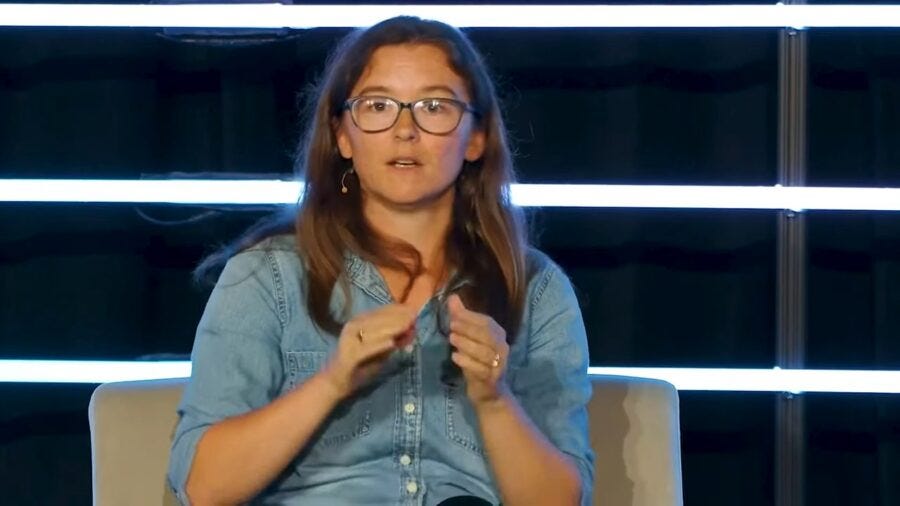
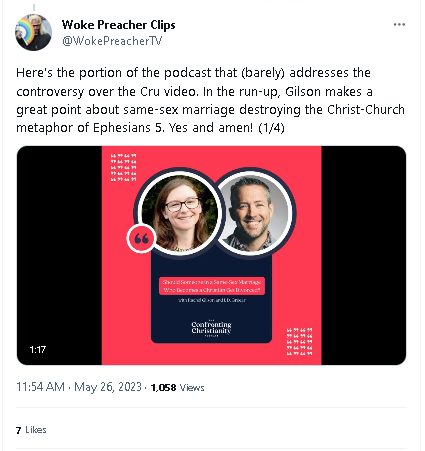
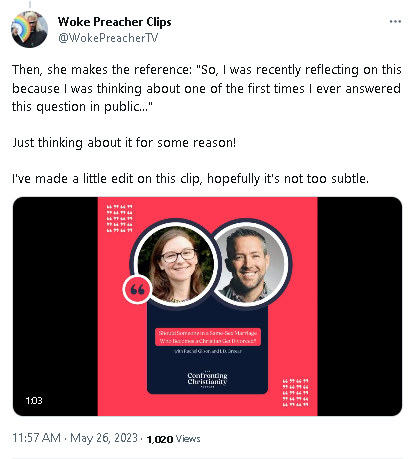
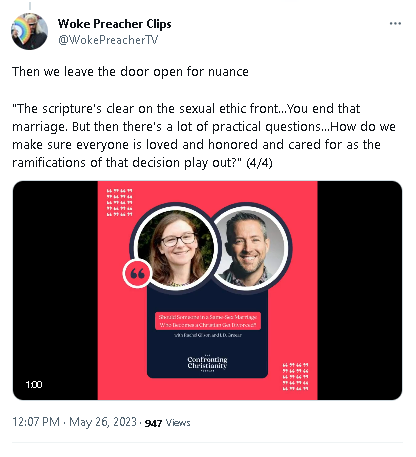
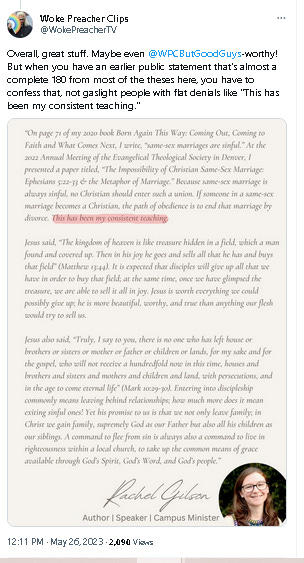
Of Course, JD Greear would be the one hosting the 'Podcast of God Whispers' that would totally side with her and endorse her coming to lead SBC Pastors Wives Conference in New Orleans this summer!